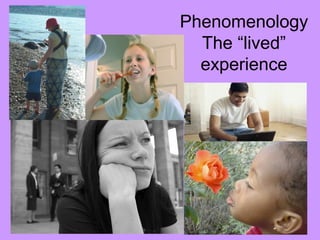This document provides an overview of phenomenology as both a philosophy and methodology. It discusses the key thinkers and schools of phenomenology, including:
- Transcendental phenomenology founded by Edmund Husserl which uses descriptive methods like phenomenological reduction and bracketing to study the structures of experience.
- Hermeneutic phenomenology developed by Martin Heidegger which rejects the possibility of bracketing and focuses on interpretive understanding of human existence or "Being-in-the-world."
- Existential phenomenology of Jean-Paul Sartre and Maurice Merleau-Ponty which studies pre-reflective lived experience and the relationship between subject and world.


























![The Phenomenological Reduction
Let us consider the following:
Each of us is currently having an experience of the hammer. We are
having a noesisnoesis of this object.
However we are unable to get knowledge of noemanoema or the thing in itself
because we are unaware of the schematic, psychological and scientific
preconceptions upon which our experience (noesisnoesis) rests.
Husserl argued through a radical reduction, it is possible to bracket off
these schema and gain knowledge of the thing as it is in itself.
In what he describes as an epoche the subject [brackets off] the natural
attitude.
The place to begin this enquiry is from our own experience of the world.
From OUR FIRST-PERSON-POINT-OF-VIEW.](https://image.slidesharecdn.com/03-phenomenology-150528024332-lva1-app6892/85/03-phenomenology-27-320.jpg)

























